Faced with increasing chaos in Costa Rica due to demonstrations and blockades, a part of the business sector decided, unilaterally, to negotiate with representatives of the movement that incites to protest, and to reject the official call by the President of the Republic.
The protests and blockades that are taking place in Costa Rica arose after it was reported that in order to access the $1.75 billion credit that it intends to request from the International Monetary Fund (IMF), the Costa Rican government proposed to tax financial transactions, raise the tax on the profits of companies and individuals, and increase the tax on real estate.
After the country was semi-paralyzed by the violent blockades made by the demonstrators on different highways, the Alvarado administration decided to withdraw the initial proposal and called for a national and multi-sector dialogue.
The government‘s proposal was not welcomed by several of the business chambers, as of the 29 seats available, only four were directed at the business sector. For the productive sector this dialogue scheme was unbalanced.
You may be interested in “Blocks and Costs to the Region”
On October 15, the Costa Rican Union of Chambers and Associations of the Private Business Sector (UCCAEP) issued a statement informing the decision not to attend the Table organized by the President of the Republic, through the State of the Nation Program, but to continue in the dialogue forum called by the Assembly of Workers of the Banco Popular.
Jose Alvaro Jenkins, President of UCCAEP, said that they reiterate their “… concern regarding the unbalanced proportion of the table promoted by the government, which does not guarantee the representation of all sectors of society in the search for a consensual solution for the country. We are in favor of dialogue and we urge the government to join the National Forum for Multisectorial Dialogue that was promoted by the National Assembly of Workers of the Popular and Community Development Bank.”
On the night of October 15, it was reported that UCCAEP and leaders of the National Rescue Movement, which promotes violent demonstrations and closures of highways in the country, held a meeting in which they negotiated the lifting of blockades on national roads.
After the news was spread, the Costa Rican Chamber of Construction (CCC) reacted through a statement published on October 16.
The CCC document details that “… given the information that circulated about a meeting between UCCAEP and the so-called National Rescue Movement, we wish to state that the Costa Rican Chamber of Construction did not receive for its information, did not approve, nor does it endorse, any agreement of the Costa Rican business sector, meeting in UCCAEP, with this group.”
“… From our organization we support dialogue and make the necessary efforts to build bridges in search of agreements, but in no way, with groups that use force, disorder and the breaking of constitutional rights of Costa Ricans. We reiterate our support to the institutionality of the country and we call for dialogue to solve the problems, in a fair, representative and balanced environment,” the statement concludes.
Stay Safe!!
